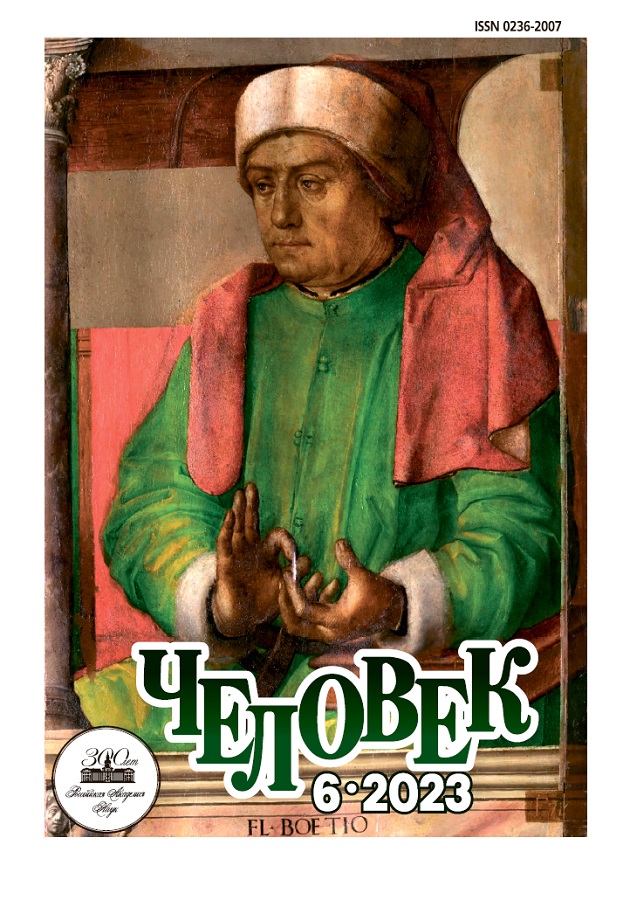Philosophical Categories of Antiquity in Debates on the Rehabilitation of Politics: The Anthropological Meaning of Civic Friendship
- Авторлар: Sheynov T.G.1
-
Мекемелер:
- National Research University Higher School of Economics
- Шығарылым: Том 34, № 6 (2023)
- Беттер: 48-64
- Бөлім: The philosophy of the himan being
- URL: https://archivog.com/0236-2007/article/view/670632
- DOI: https://doi.org/10.31857/S023620070029304-1
- ID: 670632
Дәйексөз келтіру
Аннотация
The most important problem of modern political philosophy is the loss of politics' independence from other spheres of human activity. Since the beginning of the last century, philosophers have sought to justify the uniqueness of political being and to update the modern political-philosophical vocabulary by redefining the categories of antiquity (e.g. τὸ ᾰ̓γᾰθόν, φῐλία, παρρρησία, etc.). The article is devoted to the approach to the rehabilitation of the political sphere based on the political-philosophical experience of the ancient Greeks. The theoretical basis of the study is H. Arendt's solution of the issue of depoliticization in the context of her reminiscences of the ancient heritage. The author turns to the notion of civic friendship, which largely determines Arendt's contribution to the discussions on the rehabilitation of politics and acts as a practice endowing the community with political potential. On the basis of Arendt's interpretation of the political philosophy of Socrates, Plato and Aristotle, the author justifies the appeal to this notion and shows the connection of civic friendship with other categories of ancient thought (truth, opinion, Maieutics). The analysis reveals that the requirement borrowed from Socrates to eliminate truth from the sphere of human affairs puts Arendt's philosophy in opposition to the tradition of political thought, and the use of political-philosophical categories to describe the human lifeworld allows us to consider it as a version of the hermeneutics of the subject. The author concludes that the justification of politics by means of ancient thought has an original anthropological dimension. It consists in the recognition of the significance of political action for the orientation of man in the world and the assertion of his identity in the community.
Негізгі сөздер
Авторлар туралы
Tikhon Sheynov
National Research University Higher School of Economics
ORCID iD: 0000-0002-0727-8342
21/4 bldg. 1, Staraya Basmannaya Str., 115054 Moscow, Russian Federation
Әдебиет тізімі
- Акаев С.А., Калашник П.В. Политические импликации философской парресии в поздних лекциях Мишеля Фуко: генеалогия критики и реальность философии // Полития: Анализ. Хроника. Прогноз. 2021. № 4. С. 24−42.
- Анкерсмит Ф.Р. Эстетическая политика. Политическая философия по ту сторону факта и ценности / пер. с англ. Д. Кралечкина; под науч. ред. И. Борисовой. М.: Изд. дом Высшей школы экономики, 2014.
- Арендт Х. Личная ответственность при диктатуре // Ответственность и суждение / пер. с англ. Д. Аронсона, С. Бардиной, Р. Гуляева. М.: Изд. Института Гайдара, 2013.
- Арендт Х. Философия и политика // История философии. № 13. М.: ИФ РАН, 2008.
- Аристотель. Сочинения: в 4 т. / Общ. ред. А.И. Доватура. Т. 4. М.: Мысль, 1983.
- Афанасьев В.В. Карл Шмитт: из истории политической мысли // Социологические исследования. 2014. № 6. С. 69−76.
- Баев В.Г. Правовед Карл Шмитт в политике Веймарской Германии (1919–1933) // Российский журнал правовых исследований. 2016. №3 (8). С. 225−233.
- Глухов А.А. Философская ясность: Хайдеггер равно Гитлер // Логос. 2018. Т. 28, №3. С. 91−120.
- Грей Дж. Поминки по Просвещению: Политика и культура на закате современности / пер. с англ. Л.Е. Переяславцевой, Е. Рудницкой, М.С. Фетисова и др., под общей ред. Г.В. Каменской. М.: Праксис, 2003.
- Кондуров В.Е. Политическая теология Карла Шмитта: дискурс и метод // Труды Института государства и права РАН. 2019. Т. 14. № 3. С. 49−78.
- Мальцев К.Г., Мальцева А.В., Ломако Л.Л. Политическая репрезентация в горизонте двух парадигм политического: «олицетворение» и «автоматизм правил» // Вестник Московского государственного областного университета. Серия: Философские науки. 2021. № 2. С. 51−63.
- Муфф Ш. Политика и политическое. Политико-философский ежегодник. Вып. 1. М.: ИФ РАН, 2008.
- Платон. Горгий / пер. с древнегреч. С. П. Маркиша // Собрание сочинений в 4 т. Т. 1. М.: Мысль, 1994.
- Платонов Р.С. Многозначность термина «φιλία» в этике Аристотеля // Вестник Московского университета. Серия 7. Философия. 2016. № 2. С. 26−43.
- Фомин К.В. Поворот к политическому как тенденция современной критической теории: проблема автономии политики // Философия и общество. 2020. № 1. С. 48−66.
- Шмитт К. Понятие политического / пер. с нем. Ю.Ю. Коринца, А.Ф. Филиппова, А.П. Шурбелева. СПб.: Наука, 2016.
- Штраус Л. Введение в политическую философию / пер. с англ. М. Фетисова. М.: Логос, Праксис, 2000.
- Hayoz N. Political Friendship, Democracy and Modernity. Russian Sociological Review. 2016. Vol. 15, N 4. P. 13−29.
- Mallory P. Political friendship in the era of “the social”: Theorizing personal relations with Alexis de Tocqueville. Journal of Classical Sociology. 2012. Vol. 1, N 2[1]. P. 22−42.
- Marchart O. Post-Foundational Political Thought. Edinburgh: Edinburgh University Press, 2007.
- Schall J. V. Friendship and Political Philosophy. The Review of Metaphysics. 1996. Vol. 50, N 1. P. 121−141.
- Schollmeiner P. Other Selves: Aristotle on Personal and Political Friendship. New York: State University of New York Press, 1994.
- Singer B.S.J. Thinking Friendship with and against Hannah Arendt. Critical Horizons. 2017. Vol.18, N 2. P. 93−118.
Қосымша файлдар









